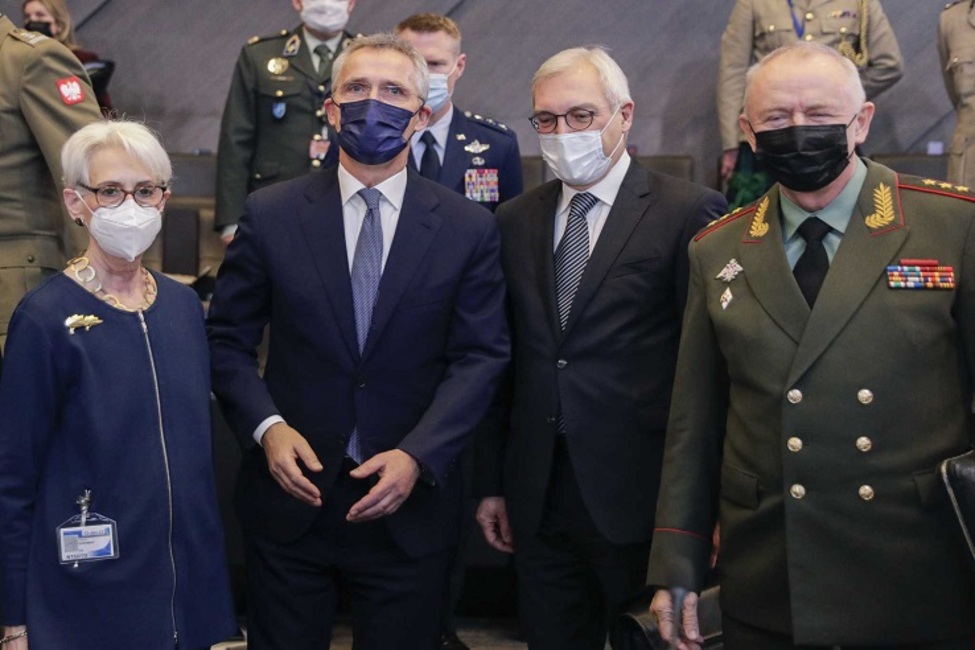Morteza Makki, in an interview with the website of the Strategic Council on Foreign Relations, said that the Russians have somehow militarily lined up on the borders of Ukraine vis-a-vis the developing policies of NATO, adding: Russia is trying to use this atmosphere of fear and concern about outbreak of war to force the West to maintain Moscow’s red lines in order to limit development of NATO.
Referring to the different news broadcast by the two sides, he said: Perhaps the optimistic and hopeful news is that the president and foreign minister of Ukraine have expressed their satisfaction over the Normandy talks and that the two sides have agreed that the Normandy Group talks with the participation of France, Germany, Ukraine and Russia, will continue in Germany soon.
Makki stressed: Such approaches are a sign of Russia’s willingness in using diplomacy to reduce the existing tension.
The expert on Europe affairs, referring to the repeated threats of the US officials with regard to the possible Russian military intervention in Ukraine, said: The British government is also trying to pursue a policy of military threat in line with the Americans. British and American aircraft continue to send weapons to Ukraine.
He continued: On the other hand, France and Germany, as the two countries of the Normandy Group, also have important positions; the two countries that are referred to as the driving force of the European Union and the main policymakers of the Union.
According to Makki, the French and Germans are trying to prevent escalation of tensions by consulting with Ukrainian and Russian officials. Because, Paris and Berlin are well aware that outbreak of any war, or even signs of a military confrontation, would entail a heavy cost for Europe.
The expert on Europe affairs, saying that the United States is less aligned with Germany and France in this regard, noted: This is at a time when Berlin has always sought to have a more conservative view in transatlantic policies, and German officials have not expressed explicit opinion with regard to NATO development policies; but in relation to the existing tension, this alignment is not seen. As we have seen, the German chancellor and foreign minister emphasize that the path of diplomacy should be considered as the most important strategy to reduce tensions in the Ukraine crisis.
Noting that the Germans are trying to avoid military threats against Russia, said: This approach has been strengthened to the point where the Berlin government has stopped sending weapons to Ukraine and despite sharp criticism of the US officials of the Germans conservative policies towards Russia, the Berlin authorities have no incentive to change their position on the Ukraine crisis.
Summarizing the total developments, the expert said: On the one hand, we see a deep rift between the European Union and the United States, as the two main parties to the NATO alliance in the face of the Ukraine crisis, and on the other hand, the Americans are trying to intensify their threats against giving Moscow any concessions in an effort to maintain Russia’s red lines, which is to stop NATO development towards Ukraine.
He stressed that the atmosphere of ambiguity and tension in the Ukraine crisis will continue.
Regarding the outbreak of war between Ukraine and Russia, the expert considered such an option unlikely, but said that escalation of the crisis and tension will bring great political and economic costs for Russia and Ukraine in the medium and long term.
The expert on Russia and Europe affairs finally evaluated the proposal of Turkish President Recep Tayyip Erdogan with an aim of mediating between Russia and Ukraine and the reasons for such a proposal and said: Turkey is a member of NATO and has good relations with Ukraine. Meanwhile, Turkish companies have invested heavily in Ukraine and good economic relations are being established between Kiev and Ankara. On the other hand, Turkey’s relations with Russia have been improved and become more prominent in recent years in political, military and security terms.
He continued: Turkey is trying to use the existing space with an aim of promoting its position as a regional power.
However, the expert believes that it is unlikely that Turkey will be able to play the role of mediator between Russia and Ukraine, stressing: In fact, where the United States, Germany and France are trying to mediate between Russia and Kiev and their aim is to reduce tensions in Ukraine, there is certainly no place for Ankara. Especially, since the French and the Germans do not want Turkey to play a role in this crisis. Therefore, Erdogan’s statement is more of representing Turkey than a country that can really play a serious role as a mediator in the Ukraine crisis.










0 Comments